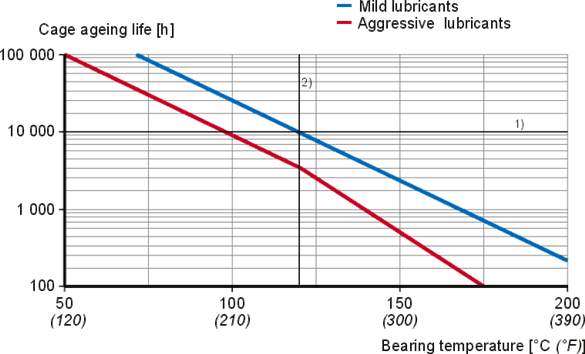

There are fundamental design differences between bearings which, together with the influence of bearing size, make certain cage designs necessary. For example:
There are fundamental design differences between bearings which, together with the influence of bearing size, make certain cage designs necessary. For example:
some bearing types need either split or snap-type cages, because they are assembled after the rings and rolling elements have been sub-assembled
othThere are fundamental design differences between bearings which, together with the influence of bearing size, make certain cage designs necessary. For example:
some bearing types need either split or snap-type cages, because they are assembled after the rings and rolling elements have been sub-assembled
other bearing types need roller-guided cages, to be self-containing
bearings of a certain combination of size and series need ring-guided cages, to limit contact stress between rolling elements and cage.
Given the specific functional demands and quantity of bearings being manufactured, the material and manufacturing methods are chosen to provide the most reliable and cost-effective cage.
Cages are mechanically stressed during bearing operation by frictional, impact, centrifugal and inertial forces. They can also be chemically influenced by certain organic solvents or coolants, lubricants, and lubricant additives. Therefore, the material type used for a cage has a significant influence on the suitability of a rolling bearing for a particular application.
Steel cages
Steel cages can be used at operating temperatures up to 300 °C (570 °F).
Sheet steel cages
Stamped sheet steel cages are made of low carbon steel. These lightweight cages have relatively high strength and, for some bearing types, can be surface treated to further reduce friction and wear in critical conditions.
Machined steel cages
Machined steel cages are normally made of non-alloyed structural steel. To reduce friction and wear, some machined steel cages are surface treated.
Machined steel cages are not affected by the mineral or synthetic oil-based lubricants normally used for rolling bearings, or by the organic solvents used to clean bearings.
Brass cages
Brass cages can be used at operating temperatures up to 250 °C (480 °F).
Sheet brass cages
Stamped sheet brass cages are used for some small and medium-size bearings. In applications such as refrigeration compressors that use ammonia, machined brass or steel cages should be used.
Machined brass cages
Most brass cages are machined from cast or wrought brass. They are unaffected by most common bearing lubricants, including synthetic oils and greases, and can be cleaned using organic solvents.
Polymer cages
Polyamide 66
Polyamide 66 (PA66) is the most commonly used material for injection moulded cages. This material, with or without glass fibres, is characterized by a favourable combination of strength and elasticity. The mechanical properties, such as strength and elasticity, of polymer materials are temperature dependent and subject to ageing. The factors that most influence the ageing process are temperature, time and the medium (lubricant) to which the polymer is exposed. Diagram 1 shows the relationship between these factors for glass fibre reinforced PA66. Cage life decreases with increasing temperature and the aggressiveness of the lubricant.

Diagram 1 - Cage ageing life for glass fibre reinforced polyamide 6
Therefore, whether polyamide cages are suitable for a specific application depends on the operating conditions and life requirements. The classification of lubricants into “aggressive” and “mild” is reflected by the “permissible operating temperature” for cages made of glass fibre reinforced PA66 with various lubricants table 1. The permissible operating temperature in table 1 is defined as the temperature that provides a cage ageing life of at least 10 000 operating hours.
Some media are even more “aggressive” than those specified in table 1. A typical example is ammonia, used as a refrigerant in compressors. In those cases, cages made of glass fibre reinforced PA66 should not be used at operating temperatures above 70 °C (160 °F).
Polyamide loses its elasticity at low temperatures. Therefore, cages made of glass fibre reinforced PA66 should not be used in applications where the continuous operating temperature is below –40 °C (–40 °F).
Polyamide 46
Glass fibre reinforced polyamide 46 (PA46) is the standard cage material for some small and medium-size CARB toroidal roller bearings. The permissible operating temperature is 15 °C (25 °F) higher than for glass fibre reinforced PA66.
Polyetheretherketone
Glass fibre reinforced polyetheretherketone (PEEK) is more suitable for demanding conditions regarding high speeds, chemical resistance or high temperatures than PA66 and PA46. The exceptional properties of PEEK provide a superior combination of strength and flexibility, high operating temperature range, and high chemical and wear resistance. Because of these outstanding features, PEEK cages are commonly available for hybrid and/or super-precision ball and cylindrical roller bearings. The material does not show signs of ageing by temperature or oil additives up to 200 °C (390 °F). However, the maximum temperature for high-speed use is limited to 150 °C (300 °F) as this is the softening temperature of the polymer.
Cages made of other materials
In addition to the materials described above, Oukaibearings for special applications may be fitted with cages made of other engineered polymers, light alloys or special cast iron. For additional information about alternative cage materials, contact us.
Lubricant | Permissible operating temperature | |
| – | °C | °F |
Mineral oils | ||
Oils without EP additives, e.g. machine or hydraulic oils | 120 | 250 |
Oils with EP additives, e.g. industrial and automotive gearbox oils | 110 | 230 |
Oils with EP additives, e.g. automotive rear axle and differential gear oils (automotive),hypoid gear oils | 100 | 210 |
Synthetic oils | ||
Polyglycols, polyalphaolefins | 120 | 250 |
Diesters, silicones | 110 | 230 |
Phosphate esters | 80 | 175 |
Greases | ||
Lithium greases | 120 | 250 |
Polyurea, bentonite, calcium complex greases | 120 | 250 |
For sodium and calcium greases and other greases with a maximum operating temperature ≤ 120 °C (250 °F), the maximum temperature for a polyamide cage is the same as the maximum operating temperature for the grease.
table 1 - Permissible operating temperatures for PA66 cages with various bearing lubricants
 Hot news
Hot news  PDF Download
PDF Download  Contact us
Contact us Tel:0635-2858518
Phone:150 9506 6919
Fax:0635-2858518
Address:Yandian Industry Park, Linqing City, Shandong Province

